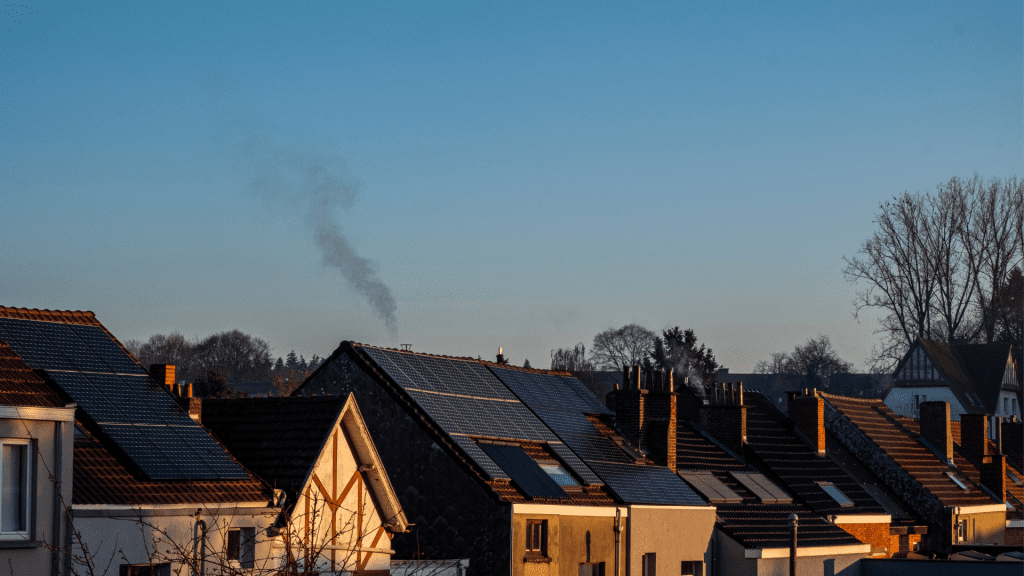What is Solar?
You’ve heard of solar but what exactly is it? Find all the information you need including solar benefits, what our customers think, and frequently asked solar questions.
About solar panels
The sun is a powerful energy source and is astronomically the biggest source of energy recieved by the earth. Solar panels or photovoltaics, harness this energy and converts into the electricity you use in your home.
Having solar panels installed on your home opens you up to a world of energy possibilities!
- Take Back Control of Energy
- 100% Renewable
- Low Carbon Electricity
- Sell Surplus Electrcity to the Grid
- Store Electricty for Later Use
What you can find on this page
How do solar panels work?
- When the sun reaches earth and shines on a solar panel, it absorbs solar energy. It does this by using a semi-conducting material that makes up individual PV cells.
- These PV cells generate electrical charges, becoming powered by the shining sunlight.
- From these electrical charges comes a direct current (DC) of electricity.
- The DC is finally passed throuhg an inverter, transforming into a alternating current electricity (AC). This is the suitable current required by household appliances.
What are the benefits of Solar Panels?
Save money on your energy bills
Once your panels generate their own electricity, you can reduce your annual power bill by hundreds of pounds.
Reduce your carbon footprint
Powering your home the sustainable way will mean you're a part of the countries carbon reduction objectives.
Renewable energy source
Solar can aid in the reduction of air pollution, which is one of the main challenges we face as a society.
Easy installation
The installation process is easy - usually only taking a day or two for your home to be fitted with solar.

Solar energy is growing fast, with around 1.2 million homes in the UK going solar, making it one of the fastest growing renewable energy solutions.
Paid Solar
Energy Advice Helpline is dedicated to providing support for homeowners looking to invest in solar panels.
Pay in full or make the most of our partners’ flexible monthly payment finance deals.
For more, visit our Solar Panel Purchase and Financing Service – Energy Advice Helpline
Solar Through ECO4
Government-backed grants like ECO4 aims to improve the energy efficiency of homes whilst helping people save money on energy bills.
Qualifying customers could receive energy upgrades that include solar, boiler upgrades, and insualtion for their property.
More information on ECO4 is available here: What is the ECO4 scheme? – Energy Advice Helpline
What are customers saying?

An average UK 3 bedroom home will save £650 per year on electricity costs based on 2021 figures. This could be substantially more based on 2023 energy prices.
Solar FAQ's
1. How long do solar panels last?
Typically, solar panels can have an impressive lifespan of 25 to 30 years.
2. Do solar panels work on cloudy days or during winter?
Solar panels will still work even if the sun isn't shining. However, their efficiecny can decrease when there is less sunlight and will still generate up to 25% of their usual output.
3. What maintenance do solar panels require?
It is a good idea to keep your solar clean and free of any debris like dirt and leaves. In areas that see heavy snow, regular clearing could be required.
4. What if solar produces more electricity than I need?
If your solar system produces more electricity than is needed, it can be sent back to the grid through a Power Purchase Agreement.
5. Is my roof suitable for solar panels?
Several factors can determine if your property's roof is suitable for a solar system installation:
- South facing roofs are ideal but east or west-facing roofs will still produce electricity too. However, north-facing will struggle to be efficient in electricity generation.
- A roof angle between 30-40 is most favourable but will still work with different angles.
- There should be a minimal amount of shade coming from trees, chimneys, or other buildings to result in the best electricity generation.
6. Do I need planning permission for solar?
You don't usually need to get permission to install solar panels on a residential property, but checking with your local authority may be a good idea.
7. How does the Smart Export Guarantee (SEG) work?
This is a government-backed initiative that requires energy suppliers with over 150,000 customers, to pay households that have solar panels for the surplus electricity they export back to the grid.
8. Can I get solar panels if I live in a rented property?
It can be more challenging to install solar panels on rented property as it requires the landlord's consent. Some landlords may be open to installing solar panels, especially if it adds value to their property or reduces energy costs for tenants.
Home » Solar and Battery Packages » What is Solar?

Energy Advice Helpline is a non-profit Community Interest Company that provides support and advice on rising energy costs. Our goal is to assist people by offering guidance, signposting to other relevant services, and providing information on available options for reducing energy bills and accessing Government support.